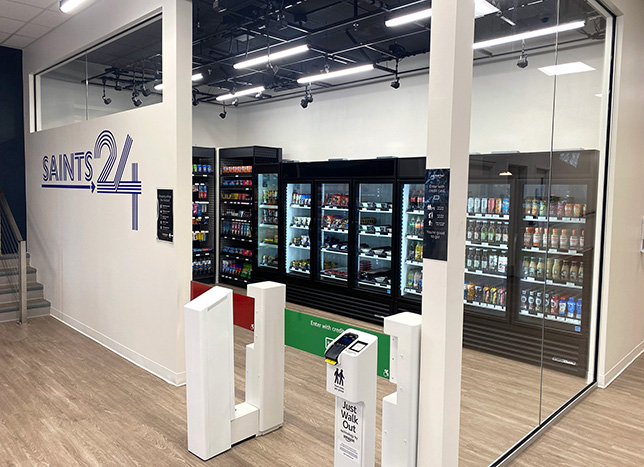Marymount University First to Use Amazon's 'Just Walk Out' Tech in Campus Store
- By Kate Lucariello
- 03/29/23

Marymount University's Saints 24 convenience store
Marymount University in Arlington, VA, has opened its Saints 24 convenience store on campus using Amazon's checkout-free Just Walk Out technology. Students and others can shop for food, toiletries, and other items by inserting or tapping their credit card at the entry gate, scanning a QR code, or extending their palm if they are Amazon One customers. The technology eliminates having to check out or wait in long lines.
How Amazon's Just Walk Out technology works:
- The same tech used in self-driving cars, computer vision, sensor fusion, and deep learning is applied here, according to Amazon. This tech is used in its own stores and in Amazon Go and select Amazon Fresh and Whole Foods Market stores.
- In addition to inserting or tapping a credit card at the entry gate, stores using a mobile app will scan a QR code. If the store is equipped with an Amazon One palm recognition device, customers can extend their palm over it and enter. Enrolling in Amazon One is quick and can be done at a kiosk outside the store, if available. Visit this page to learn more about Amazon One.
- As items are picked up, they are added to a virtual shopping cart, deleted if they are put back on the shelf, and will be charged to the shopper's payment method when they leave the store.
- Groups of family members and friends shopping together can enter the store with the card holder. Anything purchased will be charged to that person's payment method.
- Shoppers can sign up at a receipts kiosk inside the store to have receipts e-mailed or receive them through their mobile app. They can also look up receipts at justwalkout.com/receipts.
- For refunds, shoppers should contact the store, as policies vary, Amazon said.
Marymount administrators conferred with student government leaders on what they would like to have in a convenience store during the planning stage, the university said in a press release. Sandwiches, wraps, salads, beverages, and other foods and personal items were included.
"Becoming the first university in the U.S. to collaborate with Amazon in incorporating its Just Walk Out technology at an on-campus convenience shop demonstrates how Marymount is leading the way in fostering an innovative and exciting student experience that appeals to the tech-savvy college students of today," said Irma Becerra, president of Marymount University.
To learn more about installing this technology, visit Amazon's Just Walk Out page.
Marymount University was founded in 1950 by the Religious of the Sacred Heart of Mary with its main campus in Arlington, Va. The university offers health, STEM, and liberal arts programs in a wide range of disciplines at the bachelor's, master's, and doctoral levels. Visit the university's At A Glance page to learn more.
About the Author
Kate Lucariello is a former newspaper editor, EAST Lab high school teacher and college English teacher.